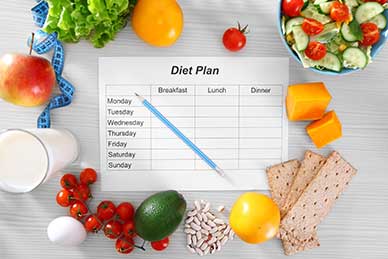Many people indulge during the holidays with the intention of losing the pounds by embarking on a crash diet later. Recent studies show this may be devastating for your waistline.
Are you already packing on the winter weight? For most people in the Western world, the holiday season is a time for stretchy waistbands. The parties and celebrations that brighten the season bring a seemingly endless parade of cookies, candy, creamy beverages and hors d’oevres. Many of us give in to temptations with the intention of embarking on a strict diet in the New Year. While this seems like a viable plan, going on a crash diet can actually make you fatter in the long run.
Is Your Crash Diet Bad for Your Brain?
Until recently, weight loss was thought of as a matter of simple math. You eat less calories and exercise more, forcing your body to supplement your diet with the calories it has stored as fat from times of surplus. However, weight loss is not this simple for most people. There are lifestyle factors that lower your metabolic rate, leaving you exhausted and making weight loss an uphill climb. A diet that severely restricts calories, also known as a crash diet, is one of these factors.
When you eat fewer calories, your brain perceives you as being in a famine. It wisely decides to lower your metabolic rate to store as much fat as possible for lean months ahead. This was beneficial to our ancestors, who often had to live through long food shortages. However, for modern people, it can mean that your crash diet simply leads to more weight gain. For this reason, experts recommend that people who want to lose weight make sensible eating decisions every day, even during the holidays, and let the weight come off slowly.
The Psychological Impact of Dieting
Dieting has become a national pastime as so many Americans struggle with being overweight or obese as well as the myriad health problems that those extra pounds can cause. However, this behavior can have a negative effect not just on your weight, but on your emotional health.
People who crash diet tend to gain back any weight they have lost, and often even a few pounds more. This is incredibly discouraging and can lead to low self-esteem. In addition, it gives many dieters a sense that they are failures and can even create a disordered relationship with food. Crash diets are also bad for your heart, causing cardiac stress, heart palpitations and lifelong damage to blood vessels. The simple joy of eating becomes an emotional struggle, creating physiological and psychological stress that can be devastating over a lifetime. People often respond to weight gained after a crash diet with even more food restrictions, creating an endless cycle of yo-yo dieting and disappointment.
What is the answer to this endless cycle? Experts recommend finding a middle road in which you are mindful of what you eat but enjoy occasional treats. Healthy people do this all year long, including during the winter season so full of temptations.
Natural Ways to Lose the Pounds Without a Crash Diet
 There are ways to lose weight and maintain a healthy weight for a lifetime, but these are not crash diets so much as permanent lifestyle changes. Here are a few ways that you can begin a lifelong journey toward a trim figure and a healthy relationship with food:
There are ways to lose weight and maintain a healthy weight for a lifetime, but these are not crash diets so much as permanent lifestyle changes. Here are a few ways that you can begin a lifelong journey toward a trim figure and a healthy relationship with food:
- Eat a healthy number of calories every day. This will keep your brain from thinking it is in a famine.
- Get plenty of exercise. This burns calories and also builds muscle, which is responsible for much of your body’s thermogenesis and basal metabolism.
- Enjoy treats in moderation. Choose one treat to enjoy at that Christmas party rather than sampling all of them.
- Take a supplement that supports your metabolism. There are many natural herbs and vitamins that can help your body to turn calories into energy at an optimal rate.
- Get plenty of sleep. Your body needs around eight hours of sleep per night or it will go into energy conservation mode.
If you want 2017 to be your healthiest year yet, put away the cookies and the plans of beginning the new year with a restrictive crash diet. Cutting too far back on calories will only lead to weight gain and unhappiness. A healthy lifestyle is not just a one-time decision, but a journey of self-care that will last your entire lifetime.


